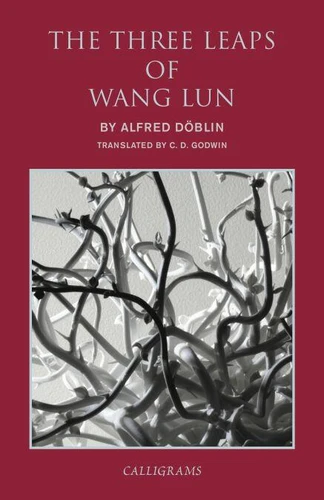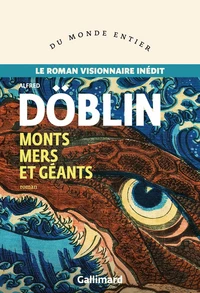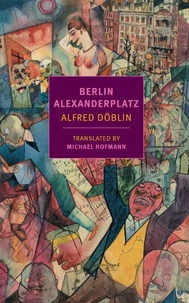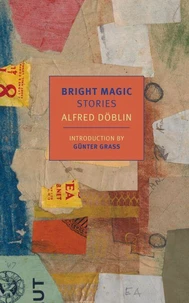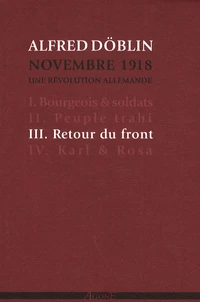The Three Leaps of Wang Lun. A Chinese Novel
Par : ,Formats :
Disponible dans votre compte client Decitre ou Furet du Nord dès validation de votre commande. Le format ePub protégé est :
- Compatible avec une lecture sur My Vivlio (smartphone, tablette, ordinateur)
- Compatible avec une lecture sur liseuses Vivlio
- Pour les liseuses autres que Vivlio, vous devez utiliser le logiciel Adobe Digital Edition. Non compatible avec la lecture sur les liseuses Kindle, Remarkable et Sony
- Non compatible avec un achat hors France métropolitaine
 , qui est-ce ?
, qui est-ce ?Notre partenaire de plateforme de lecture numérique où vous retrouverez l'ensemble de vos ebooks gratuitement
Pour en savoir plus sur nos ebooks, consultez notre aide en ligne ici
- Nombre de pages528
- FormatePub
- ISBN978-962-996-933-2
- EAN9789629969332
- Date de parution13/01/2015
- Protection num.Adobe DRM
- Taille2 Mo
- Infos supplémentairesepub
- ÉditeurNew York Review Books
Résumé
In 1915, fourteen years before Berlin Alexanderplatz, Alfred Döblin published his first novel, an extensively researched Chinese historical extravaganza: The Three Leaps of Wang Lun. Even more remarkably, given its subject matter, the book was written in Expressionist style and is now considered the first modern German novel, as well as the first Western novel to depict a China untouched by the West.
It is virtually unknown in English. Based on actual accounts of a doomed rebellion during the reign of Emperor Qianlong in the late 18th century, the novel tells the story of Wang Lun, a historical martial arts master and charismatic leader of the White Lotus sect, who leads a futile revolt of the "Truly Powerless." Densely packed cities and Tibetan wastes, political intrigue and religious yearning, imperial court life and the fate of wandering outcasts are depicted in a language of enormous vigor and matchless imagination, unfolding the theme of timidity against force, and a mystical sense of the world against the realities of power.
It is virtually unknown in English. Based on actual accounts of a doomed rebellion during the reign of Emperor Qianlong in the late 18th century, the novel tells the story of Wang Lun, a historical martial arts master and charismatic leader of the White Lotus sect, who leads a futile revolt of the "Truly Powerless." Densely packed cities and Tibetan wastes, political intrigue and religious yearning, imperial court life and the fate of wandering outcasts are depicted in a language of enormous vigor and matchless imagination, unfolding the theme of timidity against force, and a mystical sense of the world against the realities of power.
In 1915, fourteen years before Berlin Alexanderplatz, Alfred Döblin published his first novel, an extensively researched Chinese historical extravaganza: The Three Leaps of Wang Lun. Even more remarkably, given its subject matter, the book was written in Expressionist style and is now considered the first modern German novel, as well as the first Western novel to depict a China untouched by the West.
It is virtually unknown in English. Based on actual accounts of a doomed rebellion during the reign of Emperor Qianlong in the late 18th century, the novel tells the story of Wang Lun, a historical martial arts master and charismatic leader of the White Lotus sect, who leads a futile revolt of the "Truly Powerless." Densely packed cities and Tibetan wastes, political intrigue and religious yearning, imperial court life and the fate of wandering outcasts are depicted in a language of enormous vigor and matchless imagination, unfolding the theme of timidity against force, and a mystical sense of the world against the realities of power.
It is virtually unknown in English. Based on actual accounts of a doomed rebellion during the reign of Emperor Qianlong in the late 18th century, the novel tells the story of Wang Lun, a historical martial arts master and charismatic leader of the White Lotus sect, who leads a futile revolt of the "Truly Powerless." Densely packed cities and Tibetan wastes, political intrigue and religious yearning, imperial court life and the fate of wandering outcasts are depicted in a language of enormous vigor and matchless imagination, unfolding the theme of timidity against force, and a mystical sense of the world against the realities of power.

